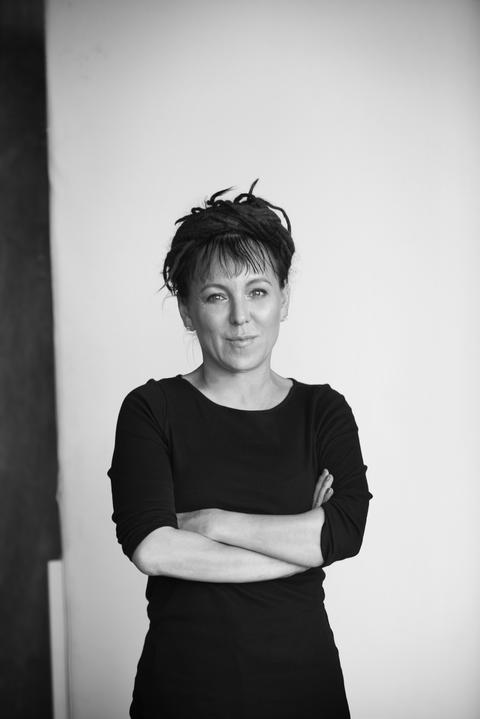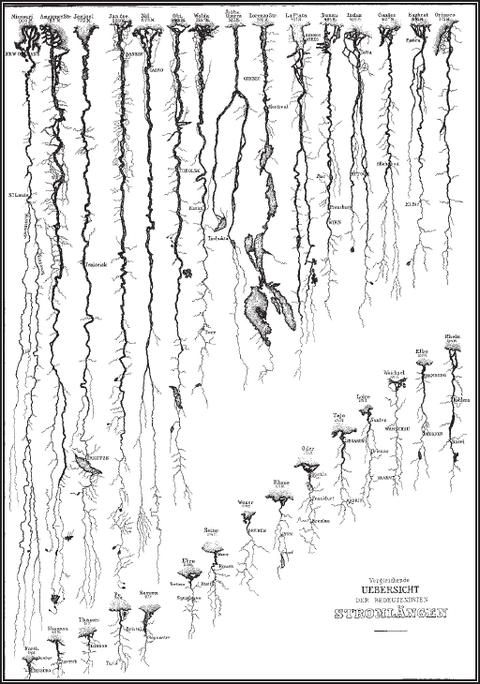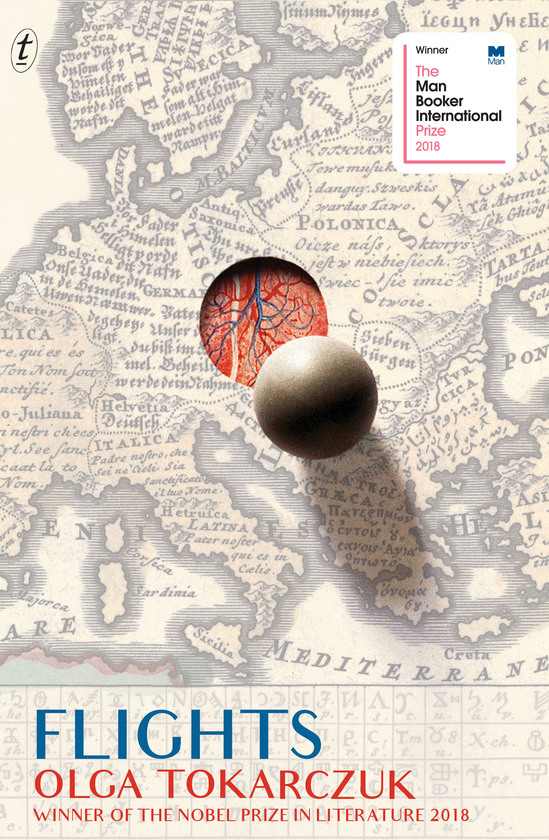
This month, Text published a rather remarkable Polish novel called Flights by Olga Tokarczuk.
Why are we publishing this book? The editor for Flights, Penny Hueston, has put together a short piece on why Text feels so passionate about Olga Tokarczuk and her writing.
Once you’ve read Penny’s piece, read our short extract...
Polish writer Olga Tokarczuk’s Flights is one of the most exhilarating books I’ve read in a long time. Think Sebald, Kundera, and our own Nicolas Rothwell, who has described Flights as a “novel in essays, a world-exploration in words”. But Tokarczuk’s is a more playful, humorous and eccentric vision. She is deeply curious about how we inhabit our bodies, about travel in all its aspects, and what exactly we mean by ‘home’.

The title of this extraordinary novel comes from the word bieguni, the name of the wanderers, an obscure Slavic sect who believed, in the tradition of the travelling Buddhist monks and yogi, that constant movement was sacred. For them, to settle was to fall into the hands of the devil. In a riveting monologue in Flights, a bieguni woman explains why tyrants hate nomads and persecute people like Gypsies and Jews. The narrator, who resembles the author, is likewise always on the move and attracted to the margins and marginalia of life, to wunderkammers, bizarre specimens and magical, fantastical objects.
Some of the mesmerising stories, both fictional and factual, include the imagined biography of the Flemish anatomist, Verheyen who identified the Achilles tendon, and who writes letters to his amputated leg; a woman whose mission is to write “a book of infamy” by cataloguing all of humanity’s cruelties; the account of Chopin’s heart as it makes its journey from Paris to Warsaw, stored in a sealed jar beneath his sister’s skirt; tales of Dr Blau, who loves to cut up bodies; the bizarre account of an eighteenth-century Austrian courtier whose corpse was stuffed because he was black; the quest of a Polish woman who emigrated to New Zealand as a teen but must now return in order to poison her terminally ill high-school sweetheart. And you can also read a fascinating analysis of airports! Since they provide everything, Tokarczuk asks, ‘In what possible way could airports be considered inferior to actual cities, nowadays?’

Olga Tokarczuk was born in 1962 and trained as Jungian psychologist. She has written eight novels, two short story collections and has been widely translated. She now lives in a Polish village, runs her own small publishing company and literary festival, and is one of the most admired and successful writers in Poland. She has won the most prestigious Polish literary prize, the Nike, twice.
After we had bought the rights to Flights, I was lucky enough to meet Olga when she was interviewed by Deborah Levy at the wonderful London Review of Books Bookshop during the London Book Fair earlier this year, when Poland was the country of honour. She has an electrifying presence: piercing intelligence, a brilliant lateral mind and a wonderfully sharp sense of humour. We had dinner together afterwards—with her husband, an artist, who is also her agent, and Jacques Testard of Fitzcarraldo Editions, her dynamic British publisher. I got the impression over dinner that Olga needs her dark humour in order to live in Poland, where the regime has caused problems for her, especially with her leftist politics and active membership of the Polish Greens party. She has received death threats and been publicly attacked as anti-patriotic. In her response, she claimed that her attackers were xenophobic and racist. At dinner she discussed the difficulties of living in her homeland.
Jennifer Croft’s translation of Flights is masterful and fully inhabits Tokarczuk’s brilliantly nomadic mind. Nobel Prize laureate, Svetlana Alexievich (whose book Secondhand Time Text also publishes), calls Olga Tokarczuk ‘a magnificent writer’. I urge you to read Flights—it is an intimate exploration of our shared humanity, the myriad connections between our minds, our bodies, and the places we travel to, as well as the strange paraphernalia of our lives—things that might be more important now than the bluster of politics. In these sometimes scary times, Flights should be our handbook.
Read a short excerpt from Flights and discover this for yourself:
The first trip I ever took was across the fields, on foot. It took them a long time to notice I was gone, which meant I was able to make it quite some distance. I covered the whole park and even – going down dirt roads, through the corn and the damp meadows teeming with cowslip flowers, sectioned into squares by ditches – reached the river. Though of course the river was ubiquitous in that valley, soaking up under the ground cover and lapping at the fields.
Clambering up onto the embankment, I could see an undulating ribbon, a road that kept flowing outside of the frame, outside of the world. If you were lucky, you might catch sight of a boat there, one of those great flat boats gliding over the river in either direction, oblivious to the shores, to the trees, to the people who stand on the embankment, unreliable landmarks, perhaps, not worth remarking, just an audience to the boats’ own motion, so full of grace. I dreamed of working on a boat like that when I grew up – or even better, of becoming one of those boats.
It wasn’t a big river, only the Oder, but I, too, was little then. It had its place in the hierarchy of rivers, which I later checked on the maps – a minor one, but present, nonetheless, a kind of country viscountess at the court of the Amazon Queen. But it was more than enough for me. It seemed enormous. It flowed as it liked, essentially unimpeded, prone to flooding, unpredictable. Occasionally along the banks it would catch on some underwater obstacle, and eddies would develop. But the river flowed on, parading, concerned only with its hidden aims beyond the horizon, somewhere far off to the north. Your eyes couldn’t keep focused on the water, which pulled your gaze along up past the horizon, so that you’d lose your balance.
To me, of course, the river paid no attention, caring only for itself, those changing, roving waters into which – as I later learned – you can never step twice.
Every year it charged a steep price to bear the weight of those boats – because each year someone drowned in the river, whether a child taking a dip on a hot summer’s day or some drunk who somehow wound up on the bridge and, in spite of the railing, still fell into the water. The search for the drowned always took place with great pomp and circumstance, with everyone in the vicinity waiting with bated breath. They’d bring in divers and army boats. According to adults’ accounts we overheard, the recovered bodies were swollen and pale – the water had rinsed all the life out of them, blurring their facial features to such an extent that their loved ones would have a hard time identifying their corpses.
Standing there on the embankment, staring into the current, I realized that – in spite of all the risks involved – a thing in motion will always be better than a thing at rest; that change will always be a nobler thing than permanence; that that which is static will degenerate and decay, turn to ash, while that which is in motion is able to last for all eternity. From then on, the river was like a needle inserted into my formerly safe and stable surroundings, the landscape comprised of the park, the greenhouses with their vegetables that grew in sad little rows, and the pavement with its concrete slabs where we would go to play hopscotch. This needle went all the way through, marking a vertical third dimension; so pierced, the landscape of my childhood world turned out to be nothing more than a toy made of rubber from which all the air was escaping, with a hiss.
My parents were not fully the settling kind. They moved from place to place, time and time again, until finally they paused for longer near a country school, far from any proper road or a train station. Then travelling simply became crossing the unploughed ridge between the furrows, going into the little town nearby, doing the shopping, filing paperwork at the district office. The hairdresser on the main square by the Town Hall was always there in the same apron, washed and bleached in vain because the clients’ hair dye left stains like calligraphy, like Chinese characters. My mum would have her hair dyed, and my father would wait for her at the New Café, at one of the two little tables set up outside. He’d read the local paper, where the most interesting section was always the one with the police reports, gherkins and jam jars stolen out of cellars.
And then the holidays, their timid tourism, their Škoda packed to the gills. Endlessly prepared for, planned in the evenings in the early spring when the snow had all but stopped, though the ground had yet to come back to its senses; you had to wait until it finally gave itself to plough and hoe, when you could plant in it again, and from that moment forward it would take up all their time, from morning to eve.
Theirs was the generation of motor homes, of tugging along behind them a whole surrogate household. A gas stove, little folding tables and chairs. A plastic cord to hang laundry up to dry when they stopped and some wooden clothes pegs. Waterproof tablecloths. A ready-made picnic set: coloured plastic plates, utensils, salt and pepper shakers, and glasses.

Somewhere along the way, at one of the flea markets that he and my mother particularly loved to visit (since they were not interested, for instance, in having their pictures taken at churches or monuments), my father had purchased an army kettle – a brass device, a vessel with a tube in the middle that you would fill up with tinder you lit on fire. Though you could get electricity at the campsites, he would heat up water in that smoking, spluttering pot. He’d kneel down over the hot kettle, taking no small pride in the gurgle of the boiling water he’d then pour over our tea bags – a true nomad.
They’d set up in the designated areas, at campsites where they were always in the company of others just like them, having lively conversations with their neighbours surrounded by socks drying on tent cords. The itineraries for these trips would be determined with the aid of guidebooks that painstakingly highlighted all the attractions. In the morning a swim in the sea or the lake, and in the afternoon an excursion into the city’s history, capped off by dinner, most often out of glass jars: goulash, meatballs in tomato sauce. You just had to cook the pasta or the rice. Costs were always being cut, the Polish zloty was weak – penny of the world. There was the search for a place where you could get electricity and then the reluctant decamping after, although all journeys remained within the same metaphysical orbit of home. They weren’t real travellers: they left in order to return. And they were relieved when they got back, with a sense of having fulfilled an obligation. They returned to collect the letters and bills that stacked up on the chest of drawers. To do a big wash. To bore their friends to death by showing pictures as everyone attempted to conceal their yawns. This is us in Carcassonne. Here’s my wife with the Acropolis in the background.
Then they would lead a settled life for the next year, going back every morning to the same thing they had left in the evening, their clothes permeated by the scent of their own flat, their feet tirelessly wearing down a path in the carpet.
That life is not for me. Clearly I did not inherit whatever gene it is that makes it so that when you linger in a place you start to put down roots. I’ve tried, a number of times, but my roots have always been shallow; the littlest breeze could always blow me right over. I don’t know how to germinate, I’m simply not in possession of that vegetable capacity. I can’t extract nutrition from the ground, I am the anti-Antaeus. My energy derives from movement – from the shuddering of buses, the rumble of planes, trains’ and ferries’ rocking.
I have a practical build. I’m petite, compact. My stomach is tight, small, undemanding. My lungs and my shoulders are strong. I’m not on any prescriptions – not even the pill – and I don’t wear glasses. I cut my hair with clippers, once every three months, and I use almost no make-up. My teeth are healthy, perhaps a bit uneven, but intact, and I have just one old filling, which I believe is located in my lower left canine. My liver function is within the normal range. As is my pancreas. Both my right and left kidneys are in great shape. My abdominal aorta is normal. My bladder works. Haemoglobin 12.7. Leukocytes 4.5. Haematocrit 41.6. Platelets 228. Cholesterol 204. Creatinine 1.0. Bilirubin 4.2. And so on. My IQ – if you put any stock in that kind of thing – is 121; it’s passable. My spatial reasoning is particularly advanced, almost eidetic, though my laterality is lousy. Personality unstable, or not entirely reliable. Age all in your mind. Gender grammatical. I actually buy my books in paperback, so that I can leave them without remorse on the platform, for someone else to find. I don’t collect anything.
I completed my degree, but I never really mastered any trade, which I do regret; my great-grandfather was a weaver, bleaching woven cloth by laying it out along the hillside, baring it to the sun’s hot rays. I would have been well suited to the intermingling of warp and weft, but there’s no such thing as a portable loom. Weaving is an art of sedentary tribes. When I’m travelling I knit. Sadly in recent times some airlines have banned the use of knitting needles and crochet hooks on board. I never learned, as I say, any particular line of work, and yet in spite of what my parents always used to tell me, I’ve been able to get by, working different jobs as I go, staying afloat.
When my parents went back to the city after their twenty-year experiment, when they had finally tired of the droughts and the frosts, healthy food that ailed all winter in the cellar, the wool from their own sheep assiduously stuffed inside the gaping mouths of comforters and pillows, they gave me a little bit of money, and I set off on my first trip.
I took odd jobs wherever I happened to be. In an international factory on the outskirts of a large metropolis I assembled antennae for high-end yachts. There were a lot of people like me there. We were paid under the table, and never questioned about where we came from or what our plans were for the future. Every Friday we got our money, and whoever didn’t feel like it anymore simply didn’t come back on Monday. There were school graduates taking a break before applying to university. Immigrants still en route to that fair, idyllic country they were sure was somewhere in the West, where people are brothers and sisters, and a strong state plays the role of parent; fugitives from their families – from their wives, their husbands, their parents; the unhappily in love, the confused, the melancholic, those who were always cold. Those running from the law because they couldn’t pay off their debts. Wanderers, vagabonds. Crazy people who’d wind up in the hospital the next time they fell ill again, and from there they’d get deported back to their countries of origin on the basis of rules and regulations shrouded in mystery.
Just one person worked there permanently, an Indian man who had been there for years, though in reality his situation was no different from ours. He didn’t have insurance or paid holidays. He worked in silence, patiently, at an even keel. He was never late. He never found any need to take time off. I tried to talk some people into setting up a trade union – these were the days of Solidarity – if only for him, but he didn’t want to. Touched by the interest I’d taken in him, however, he began to share with me the spicy curry he brought in a tiffin-carrier every day. I no longer remember what his name was.
I was a waitress, a maid in an upscale hotel, and a nanny. I sold books. I sold tickets. I was employed in a small theatre for one season to work in wardrobe, making it through that long winter ensconced backstage amidst heavy costumes, satin capes and wigs. Once I’d finished my studies, I also worked as a teacher, a rehab counsellor, and – most recently – in a library. Whenever I managed to save any money, I would be on my way again.
We strongly urge you to get hold of Flights by Olga Tokarczuk.
Flights is available now at all good bookshops, on the Text website and in eBook.
Until next time,
Keep reading,
The Texters.



